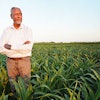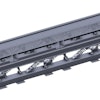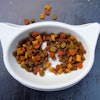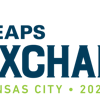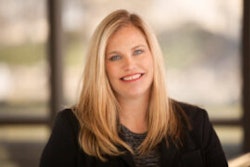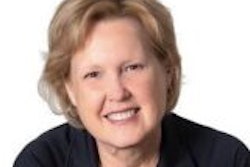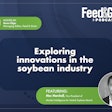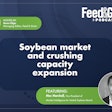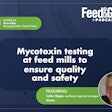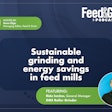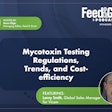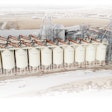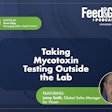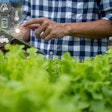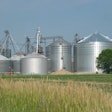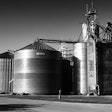Steven Kilger, the host of theFeed & Grain Podcast, speaks toLara Moody, executive director of theInstitute for Feed Education & Research (IFEEDER), about its new Animal Food Industry Sustainability Toolkit in this mini-episode.
The new Sustainability Toolkit is part of IFEEDER'sSustainability Road Map project, the institute's effort to help the animal feed industry in its effort to become more environmentally sustainable.
Transcript:
Steven Kilger00:00
Hello, everyone, my name is Steven Kilger, managing editor of Feed & Grain and Host of the Feed & Grain Podcast. We have a special mini-episode for you today. My guest Lara Moody is the executive director of the Institute for Feed Education & Research, also known as IFEEDER. So, IFEEDER just announced this new Sustainability Toolkit for the feed industry at the International Production and Processing Expo (IFEEDER) happening here in Atlanta.
She had just a few minutes to stop by and chat with me about the new toolkit and what it will mean for the industry. It's big news, and if we can learn just a little bit more about it here. But before we start, I have just a little bit of housekeeping to do. If you're listening to this podcast within a podcast app, please consider subscribing and or leaving a review. If you have an idea for a topic you'd like me to cover in one of these podcasts or someone in the animal feed, grain handling, or related industries you'd like me to talk to, let me know. The podcast page for this episode and all other episodes on feedandgrain.com has a button right under the title that you can click on, and it'll send me an email directly. I'd love to hear from you and hear your thoughts. But onto the conversation.
Kilger01:10
Hey, Lara, how are you doing today?
Lara Moody01:12
Hey, Steve, how's it going?
Steven Kilger01:23
For those who aren't familiar with you. Can you tell me a little bit more about yourself and your role with IFEEDER?
Moody01:30
My name is Lara Moody. I'm the executive director at the Institute for Feed Education & Research, which is IFEEDER. IFEEDER’s mission is to advance the understanding and trust in a sustainable animal feed and pet food supply chain through research and education. So for the last almost two years now at IFEEDER, that's what we've been working on.
Kilger01:53
去年,当我们说IFEEDER开始really focus on sustainability. With the sustainability roadmap, how was that project been going?
Moody02:02
Yeah, it's been a very busy year in the sustainability space for IFEEDER. We have spent the last year working with 23 industry members from across the whole animal feed industry and including folks that have not done anything in the sustainability space to folks who are big multinational, publicly traded companies with teams in the sustainability space. We've been working with them to gather insights into what the needs are for sustainability in the industry. But also what their customer’s needs are.
We've also been partnering with the Context Network and the expertise that they bring to the table, as well as engaging with other industry members and, really importantly, downstream stakeholders to see what kind of needs are out there in the sustainability space so that we can develop some guidance and a roadmap to advance that. And that has led to our creation of the sustainability roadmap for a feeder, but importantly, a tool and a resource called the animal food industry sustainability toolkit that we're launching for industry members this week.
Kilger03:07
So, what is the Animal Food Industry Sustainability Toolkit? How does it work?
Moody 03:11
The toolkit is designed to provide an on-ramp for companies that are seeking to solidify their own sustainability journeys within their corporate culture and decision-making. The toolkit is intended to be useful for folks who are really early on in their sustainability journeys to folks who maybe have a little bit more time under their belt. There's probably going to be some idea or resource in there, and it's of value to them.
We gathered information through survey work through interviews to really understand what the needs were for the industry. And we've kind of built out a nine-step process. We actually call it our “crawl, walk, run.” Depending on where you are on the sustainability journey, you're just getting started in that “crawl” space that is going to be really helpful to you.
We've created some practical tools and resources that the industry can use, such as how do you conduct a materiality assessment? Or how do you build the business case for your organization in the sustainability space? Or if you're further down the chain, some insights into message mapping because it's really important to understand how to convey your sustainability story to your downstream stakeholders. That toolkit is going to be a collective that's going to be available on the IFEEDER website for AFIA members to download. And if you're not an AFIA member, there also be a way that you can obtain that.
Kilger04:31
Can you tell me a little bit about the Animal Agriculture Sustainability Summit that's happening at IPPE this year?
Moody04:38
Each year, a group of organizations, basically theNorth American Meat Institute,IFEEDER and the US Roundtable for Sustainable Poultry and Egg, get together and host the Animal Ag Sustainability Summit which brings together insights from our own organizations on what we're doing in the sustainability space and gives us a chance to convene and provide updates and gather input. But from industry members, but we also try to bring in somebody who can really add to that conversation.
This year, we've got the Undersecretary of Farm Production and Conservation fromUSDA Robert Bonnie coming in to speak to us. He's going to speak to the climate-smart ag commodity grants that USDA announced this year. Specifically, he's going to provide us with some insights into the benefits that animal agriculture could potentially realize from some of those projects as they get underway. So that's going to be, I think, a really interesting conversation and a great place for us to build some of the updates that our own organizations are doing to show what we're doing to advance sustainability for animal agriculture.
Kilger05:40
And how can listeners get involved with IFEEDER, if they're not already?
Moody05:46
If you're not already one, you can always go toifeeder.org. There's a place to donate if you're interested in contributing to our efforts. If you're interested in learning more about the Toolkit, there's a sustainability page on ifeeder.org. And, of course, we're at the show this week. So come by the AFIA and IFEEDER booth and we'd be glad to talk to you about the toolkit and other efforts that IFEEDER has underway.
Kilger06:10
Well, thank you so much for talking to me. I'm looking forward to seeing you at IPPE this year. That will be fun. And thank all of you for listening.

.jpg?auto=format%2Ccompress&crop=faces&fit=crop&h=48&q=70&w=48)
